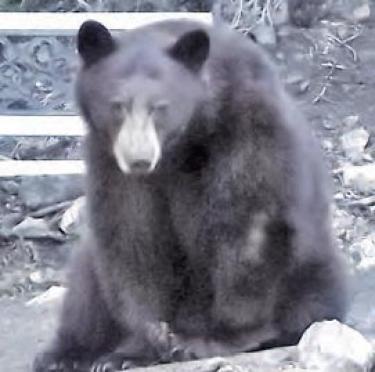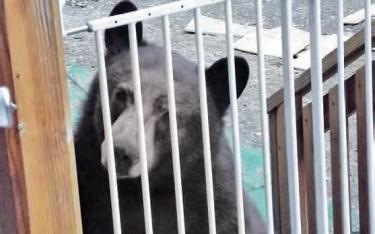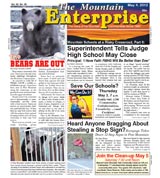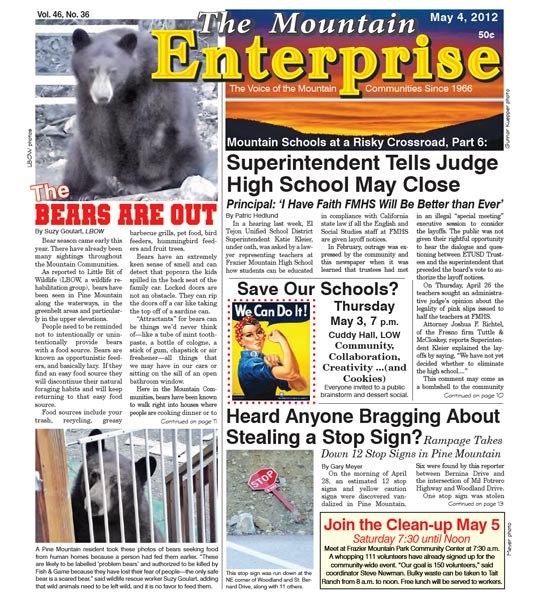
Image 1 of 3
A Pine Mountain resident took these photos of bears seeking food from human homes because a person had fed them earlier. "These are likely to be labelled problem bears and authorized to be killed by Fish & Game because they have lost their fear of people—the only safe bear is a scared bear," said wildlife rescue worker Suzy Goulart, adding that wild animals need to be left wild, and it is no favor to feed them.
Image 2 of 3
A Pine Mountain resident took these photos of bears seeking food from human homes because a person had fed them earlier. "These are likely to be labelled problem bears and authorized to be killed by Fish & Game because they have lost their fear of people—the only safe bear is a scared bear," said wildlife rescue worker Suzy Goulart, adding that wild animals need to be left wild, and it is no favor to feed them.![[John Barrios photos]](https://mountainenterprise.com/fds/images/story/fs_10221_3.jpg)
Image 3 of 3
[John Barrios photos]
By Suzy Goulart, LBOW
Bear season came early this year. There have already been many sightings throughout the Mountain Communities.
As reported to Little Bit of Wildlife (LBOW, a wildlife rehabilitation group), bears have been seen in Pine Mountain along the waterways, in the greenbelt areas and particularly in the upper elevations.
People need to be reminded not to intentionally or unintentionally provide bears with a food source. Bears are known as opportunistic feeders, and basically lazy. If they find an easy food source they will discontinue their natural foraging habits and will keep returning to that easy food source.
Food sources include your trash, recycling, greasy barbecue grills, pet food, bird feeders, hummingbird feeders and fruit trees.
Bears have an extremely keen sense of smell and can detect that popcorn the kids spilled in the back seat of the family car. Locked doors are not an obstacle. They can rip the doors off a car like taking the top off of a sardine can.
“Attractants” for bears can be things we’d never think of—like a tube of mint toothpaste, a bottle of cologne, a stick of gum, chapstick or air freshener—all things that we may have in our cars or sitting on the sill of an open bathroom window.
Here in the Mountain Communities, bears have been known to walk right into houses where people are cooking dinner or to break through window screens and swipe a jar of peanut butter off the kitchen counter.
Even a refrigerator or freezer in the garage is not safe from a bear. Once they have raided a refrigerator, they recognize them and will break in every chance they get. These things are considered unintentional feeding.
Intentional feeding is when someone puts food scraps of any kind out for their own enjoyment of watching wildlife up close and personal. Not only is this illegal, it is guaranteed to ensure the bear will eventually be deemed a “problem bear” by Fish and Game.
California has no bear relocation program. Problem bears are trapped and killed.
You are not helping a bear by feeding it. In fact, you are probably going to be the direct cause of a bear’s untimely death. You are also victimizing your neighbors. How? As bears lose their fear of you, they will lose their fear of all humans. Black bears are naturally timid and will turn and run if you make loud noises or yell, but that protective instinct is changed if it has been getting a free meal from humans!
To keep your home, your neighbors’ homes and the bears safe from harm, here are some practical tips for bear-proofing your home:
- Don’t leave garbage near your house or on decks.
- Don’t leave pets or pet food outside.
- Don’t leave food, food wrappers, gum, mints, chapstick, or air fresheners in your car.
- Make bird feeders inaccessible to bears or take them down.
- Don’t leave accessible windows or doors open. Screens are not bear-proof.
- Clean barbecues thoroughly.
- Don’t use mouse or rat poison–it attracts bears.
If a bear comes onto your property, don’t talk nicely to them. Make them think you will harm them. To stay alive, they need to remain afraid. Be aggressive. Yell or blow an air horn to let the bear know he is unwelcome in your yard. When he turns to run, throw a rock at his rear quarters (not his face). Be dominant, not submissive. Black bears, even mothers with cubs, can easily be scared off.
Spray original scent Pine- Sol on windows and door casings to mask food odors coming from inside your house. Repeat often. Place open pans of Pine-Sol in the garage to mask garbage smells and food in outside refrigerators and freezers.
If you are having problems with bears, or any wildlife, contact Little Bit of Wildlife for assistance. 661-242-2712, 242-1803, 242-1781 or 242-2955. Little Bit of Wildlife is a satellite branch of Tehachapi Wildlife Education and Rehab, working under mandated state and federal permits.
This is part of the May 04, 2012 online edition of The Mountain Enterprise.
Have an opinion on this matter? We'd like to hear from you.


